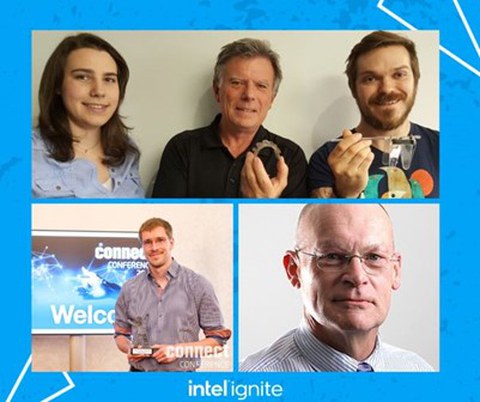Jun 27, 2022
IHM EXIST-Business Startup Grant Alumni Startup PowerON were selected for the Intel Ignite Incubator and awarded as winners of the startup competition at the connect conference 2022.

Top: Three of PowerON's founders: CTO Dr. Katie Wilson, CSO Prof. Iain Anderson, CEO Dr. E.-F. Markus Henke. Bottom left: PowerON Senior Development Engineer Moritz Scharff accepting the Connect Startup Awards, Bottom right: 4th PowerON Founder COO Dr. Ross Green.
On June 21, this year's Start-up Award of the city of Dresden was presented in cooperation with the international trade magazine connect from the publishing house WEKA MEDIA PUBLISHING GmbH. The IHM EXIST-Business Startup Grant Alumni Startup PowerON, which still cooperates closely with the TU Dresden, convinced the jury in a multi-stage selection process and received the first place.
The award was presented by the city of Dresden and connect and includes extensive communications support for the winners - with editorial support and social media postings, advertorials, company portraits and case studies in connect magazine. With the Start-up Award, the initiators want to promote innovative companies and give them a platform.
Initially, 10 companies were selected from more than 100 start-ups, which were evaluated by the jury according to a points system - CodesSquare GmbH&Co.KG, IoT-Plan GmbH and PowerON GmbH as well as SEMRON GmbH made it to the final. They faced the jury in a live pitch, consisting of Bettina Leutner, Managing Director at CREAM COMMUNICATION, Jessica Oldenburger, Content Manager at WEKA MEDIA PUBLISHING, Uwe Richter, Head of Department Smart City, Office for Economic Development, State Capital Dresden, Dirk Waasen, Publishing Director WEKA MEDIA PUBLISHING and Sophia Wolter, Office for Economic Development, State Capital Dresden. PowerON GmbH and SEMRON GmbH convinced with innovative strength and feasibility and were chosen as winners on the evening of the first day of the connect conference 2022.
In addition, PowerON was recently accepted by Intel into the prestigious startup incubator Intel Ignite. Intel Ignite is an Intel Corporation program for deep tech startups. It helps transform breakthrough ideas into industry-changing technologies by providing mentorship, technical support and business acumen to entrepreneurs. The program is helping the PowerON team achieve its goal of breaking down the barriers between humans and robots.
"We are incredibly proud of our team for their hard work in making it possible for us to successfully apply to Ignite," commented Dr. E.-F. Markus Henke, CEO of PowerON, "And even though the next few weeks will be incredibly demanding and intense for us, we are excited to learn so much in such a short amount of time and take our company to the next level." Intel Ignite includes an intensive program of mentoring, in-person and virtual coaching, and social events over 12 weeks. Only about 4% of applicants from across Europe succeed in getting into the program.
About PowerON:
Robots that load and unload the dishwasher, hang up the laundry, or help care for relatives have only been seen in movies. PowerON GmbH wants to make a significant contribution to realizing these visions. To do so, robots must be able to act more like humans. For example, the human arm serves the entrepreneurs as a bionic model for a gripper, because robotic gripping must become more sensitive, more pliable and thus more natural. With the goal of breaking down the barriers between humans and machines, PowerON is developing flexible electronic components. To do this, the team is relying on so-called dielectric elastomers. In contrast to established forms of mechanical power transmission via cable pulls or hydraulic components, electrical impulses are used to control artificial neurons, stretchable flexible sensor skins or artificial muscles in a finely dosed manner directly in the compliant material. The components are made of silicone and carbon, are inexpensive and can be produced in large quantities and in any shape using known manufacturing processes. This results in almost inexhaustible application possibilities.
In close consultation with industry partners, the startup first focused on the area of flexible sensor technology. The first product is a flexible skin that gives robotic grippers fingertip sensitivity. This determines whether and how objects are gripped, as well as preventing slipping, twisting and damage. This process can be dosed with pinpoint accuracy. Artificial intelligence will additionally enable object recognition in the future.
In conjunction with the mechanical compliance, processes can thus be automated that were previously only feasible manually. These include the handling of rubber or textile products.
In the future, PowerON also plans to produce large-area sensor skins that can be used as input interfaces for cobots in direct interaction between humans and robots. There are also plans to develop artificial muscles to drive bioinspired gripper systems and for use in prostheses and other medical devices.
The current founding team met during a research stay by Dr. Markus Henke at the University of Auckland in New Zealand. Together with Dr. Katie Wilson and then mentor Prof. Iain Anderson, as well as experienced business consultant Dr. Ross Green, they founded PowerON Ltd. in Auckland in July 2019. An Exist start-up grant additionally enabled the founding of PowerON GmbH in Dresden in August 2020. Today, the German-New Zealand PowerON Group together employs more than 15 people.
After an oversubscribed financing round in summer 2021, the team is currently preparing the next one for this fall. The capital will be used to bring the sensor array for robotic grippers called "TouchDetect" to product maturity and launch it on the market with existing and new industry partners. The company is open to contacts with robot and gripper manufacturers as well as system integrators in order to jointly develop new use cases in robotic gripping.
